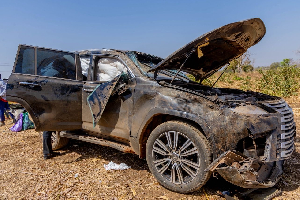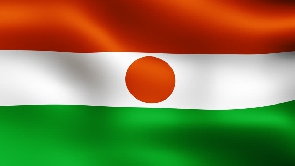For all faiths, love and support for the needy, distressed and vulnerable can be considered as one of the major spiritual heights. The Saviour did just that in the Christian faith, feeding the multitude, healing the sick and desolate and caring for the poor. The Prophet Mohammed instructed his faithful to give to the poor and needy and all other faiths share similar experiences.
The world today has in so many ways become impersonal. Family units, communities and communal living is giving way to individualism. Intolerance is the result and with it, increasing divorce, crime, wars, insurgency leading to refugeeism as we see on our screens today in all parts of the world. In these times of great turmoil, there is an oasis of profound humanitarianism.
Humanitarianism
I was privileged to have had the opportunity to visit Salt Lake City, USA to attend the board meeting of Ensign College of Public Health, Kpong in the Eastern Region of Ghana.
After a successful board meeting in which the proposal to make the beautiful Ensign campus an external campus of the University of Utah was approved and ratified by the board, we were given a history of Salt Lake City. We were told of how the pioneers after persecution in all parts of America found this barren land that nobody wanted.
All it had was the surrounding mountains and the salt lake that nothing could survive in. Strangely even in this area, members of the Church of Latter Day Saints were confronted by the American army not to protect them but to make them aware they were there ready to attack them.
The barren land, by dint of hard work, has been transformed into a prosperous, elegant, disciplined and respectable community.
We visited Utah Bishops' Central Storehouse and the Humanitarian Centre and I was bowled over by the profound humanitarianism. The Bishops' Central Storehouse occupies an area of more than 36 acres with a total built-up area of 561,520 sq feet and an expandable area of 100,000 sq feet.
It had offices, conference rooms, restrooms, shipping offices, dispatch offices in addition to the storehouse. We sat in the golf cart in order to see every part of the store, freezer, cooler and the cold dock for milk and meat. The storehouse has 65,000 pallet spaces and 70 percent of the produce there comes from the farms of the church. Farm produce are harvested by the teeming numbers of church volunteers and sent to their canneries and canned and transported to the Utah Central Storehouse in trucks owned by the church.
Milk and meat come from the churches diary farms and ranches. The church is probably the largest cattle rancher in the State of Florida. The remaining 30 percent of the produce in the storehouse are purchased by the contributions members make to their bishops.
Church members are expected to fast for a day in the week and donate breakfast and lunch money to the church. That is all the contribution members are expected to make. However, there are those who give whatever they can.
In addition, church members give off time to work on the farms or anywhere that their services are needed. By this, they are able to run all their operations without significant numbers of paid staff.
Volunteerism
Members also give their time in their formative years for service. Young men and women move to faraway places for one or two years providing service to the church as volunteers either before or immediately after university.
Their parents and grandparents before them did their share of the voluntary work and , therefore, nobody escapes this service to church and humanity.
The President of Senate of the University had his two sons in South America and he spoke about his service with glee, harvesting fruits with his contemporaries, washing and bagging the fruits to move to the canneries, planting and doing what he considered as enjoyable service.
The Central Store had in excess of 50 forty-feet trucks, some refrigerated, which cart the produce from canneries to the storehouse and to wherever relief services had to be sent, whether in the USA as in the Katrina floods of New Orleans or in far of places such as the tsunami of Aceh, Indonesia or Haiti, just name it and they are there.
The storehouse has a fuel depot that stores enough fuel to ensure no interruption in their services for more than a year. They were at pains to report that they do not owe any bank and that everything is paid for and belongs to the church.
They are the first to respond to any relief service and collaborate with like-minded organisations such as Catholic Relief Services, Habitat and other relief offering services.
Everything is done as a free service and in their own words "what the Saviour did".
The elderly
Then it was to the humanitarian centre where the gravitas was clothing, toys, blankets, duvets etc. I was utterly surprised when I saw a video of a collection of very elderly ladies average age, 85 years, who spend their day there sowing duvets and knitting socks and gloves and sweaters.
They would rather spend the day there doing something useful than staying at home and being dotted upon. The centre collected large amounts of second-hand clothing and did the various types of selections as are done in our ‘bend down’ boutiques here in Ghana.
The first selections are sent to the laundry and prepared for their Deseret shops, where they are sold for a pittance. The shop also sells many of the farm produce, canned vegetables, fruits and meat.
The second selections are bailed in the centre for relief and the third selections are offered to persons who will have to pay for the bailing and sent to any country of their choice.
The Deseret shops are owned by the church. Everything sold there is a church produce and are discounted to help the poor and needy.
In addition to items sold, it also serves as a point for humanitarian services to the community. If anybody went there and requested for support irrespective of whether you are a church member or not, you will receive a parcel of carefully put together goods that can last a family anything up to a month.
In return, beneficiaries will only be expected to give time and service to the church in its myriad of activities. Such profound humanitarianism almost brought tears to my eyes.
At least my eyes grew moist which is very beneficial for my eyes, since that has not happened to me for years and I am not fond of putting artificial tears in my eyes.
God volunteers
The whole night as I lay down, I asked myself why any of our churches could not do what they did, what Christ did, to feed the poor, heal the sick, and cloth the desolate.
For so many years I have asked myself, so if the Anglican Church in Asante Mampong had all these years requested for large tracks of land to farm and had all of us members of the church as volunteers giving our time like we did in school during the period of ‘operation feed yourself’, the churches will be the largest contributors to food security in Ghana.
Farm produce will be sold, of course, and the money used in furtherance of God's work. The typical harvest will be different. It will not be poor people bringing their best produce to give to the church to be auctioned, even though that could be still done as well, but by and large, it shall be farm produce, grown and harvested by church members and sold to the many visitors who are invited to the churches on harvest day.
I do not think that it is too late for our churches, particularly in these hard times, to adopt that strategy rather than the orthodox churches now adopting what the charismatic churches do, inviting members to contribute either building materials or money for this project or another. The projects never end and parishioners never stop contributing.
Volunteerism and humanitarianism are two virtues that, like our value systems, have gone out of our national psyche. I always wonder why we are keen to consider our country as a Christian country or for a better word, religious country, but charity does not easily flow from our lips or pockets unless in desperation when the media come out on behalf of a child with a health problem. We must create an unquenchable appetite to give directly to worthy causes like Christ did.
I doff my hat off for the early pioneers, who by dint of hard work, built the State of Utah and all in it for instituting such profound humanitarianism that is worthy of emulation across the world. Best practice wherever it is, must be emulated.
Opinions of Sunday, 11 October 2015
Columnist: Prof. Agyeman Badu Akosa
Profound humanitarianism
Entertainment

Blackmail Saga: Court remands Showboy, case adjourned
Opinions











